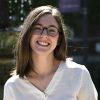During Martin Luther King Jr. weekend, students, community members and faculty faced the reality of discomfort.
The weekend, planned by the MLK Day planning committee, was packed with events: workshops, convocations, sermons, meals and more. The theme of the weekend was “It Is Time,” and students were encouraged to use the hashtag #ItIsTime on social media posts about the weekend. During each event, students had time to express pain, suffering and hope.Events kicked off Sunday morning when Sarah Thompson, executive director of Christian Peacemaker Teams, preached at College Mennonite Church. Following her sermon was a time of response and discussion where students, church and community members gathered to share thoughts and prayers.
Later that evening, the Umble Center hosted a community gathering titled “Building a Movement with Self, Story, and Song.” The evening began with a dance performance by UZIMA!, an African dance troupe. Following the performance, four panelists who have been involved with People’s History of Elkhart, Donald Brown, Elias Garcia, Dara Marquez and Will Stauffer, shared stories about social justice from their personal experiences.
On Monday morning, people filled the CMC fellowship hall to hear students read spoken-word poetry. Performers included Alia Byrd, Achieng Agutu, Ari Benjamin, Clinton Stroble, Demetria Towns and Alhassan Barrie. The poems expressed the pain that can come from being African-American.
Towns, a first-year student, read a poem she had written herself, titled “Preach.”
“It’s the right time for anybody, especially a black lady, to speak out,” Towns said when asked why she felt inspired to perform.
Directly following the spoken-word coffeehouse was Thompson’s convocation, titled “A New Unsettling Force: MLK and the Poor People’s Campaign.”
Thompson began her sermon telling the story of MLK’s work with the Poor People’s Campaign. Thompson was then interrupted by two students, Mimi Salvador Lucero and Naomi Gross, who demanded that Thompson address indigenous people, rape culture and divestment, among other things.
Thompson then redirected her convocation. “We must disrupt,” she said. She went on to describe how discomfort is key in achieving racial equality and social justice.
It was made clear throughout the day that the disruption during Thompson’s convocation was staged. Thompson said she wanted the audience to feel uncomfortable but not step away from that feeling.
Thompson encouraged students, faculty and community members to put themselves in situations where they may feel uncomfortable but embrace the feeling and learn from it.
“There is so much life on the other side of discomfort,” she said.
A number of workshops and lectures followed the convocation. Many of the workshops focused on social injustice as well as self-care. Speakers included Sarah Thompson, Amela Puljek-Shenk, Connie Caiceros, Jason Shenk and Katerina Friesen.
To end the weekend’s events, participants gathered in the CMC fellowship hall once again for a Town Hall meeting. During that time, students had the opportunity to share highlights as well as ways to continue fighting for social justice.
DaVonne Kramer, a member of the MLK Day planning committee and coordinator of retention and intercultural student support, hopes that students were challenged as well as changed by the weekend’s events.
“I hope the events we offered made a difference,” she said, “whether big or small.”


